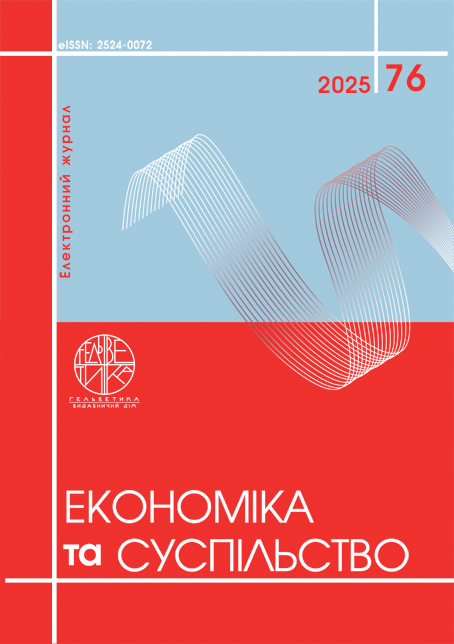INNOVATIVE MODELS OF PROJECT MANAGEMENT
Abstract
This article explores the critical task of identifying investment and innovation priorities for the sustainable development of the tourism industry in the context of accelerating digital transformation, macroeconomic uncertainty, rising consumer demands, and intensifying global competition. The study highlights essential drivers of innovative capacity in tourism, emphasizing the strategic adoption of flexible project management methodologies—Scrum, Agile, Lean, and Kanban—that ensure adaptability, rapid response, and stakeholder engagement under complex and volatile market conditions. Special attention is paid to the integration of cutting-edge digital tools such as artificial intelligence (AI), the Internet of Things (IoT), customer relationship management (CRM) systems, virtual and augmented reality (VR/AR), blockchain, and big data analytics into both the operational and strategic layers of tourism governance and business models. Through a comparative analysis of international best practices in Germany and France and an assessment of Ukrainian cases, the article uncovers key similarities, national constraints, and structural barriers to the implementation of innovation-driven reforms. Statistically grounded forecasts reveal a compound annual growth rate (CAGR) exceeding 26% for global and European AI-driven tourism markets through 2030, underlining the sector’s growing investment potential. The paper identifies underutilized institutional, digital, and managerial reserves that can boost innovation readiness and investment attractiveness in tourism ecosystems. It substantiates the growing role of hybrid project governance models that combine traditional planning mechanisms with agile principles to enhance service personalization, operational sustainability, and organizational resilience. Practical recommendations are proposed for policymakers, destination managers, entrepreneurs, and investors focused on accelerating innovation-led transformation and fostering competitiveness in tourism-dependent economies, especially in emerging markets.
References
Мартиняк І., Бакушевич І. Гібридні моделі управління проєктами в умовах сталого розвитку та цифрової економіки. Сталий розвиток економіки. 2024. № 3(50). С. 21–26. DOI: https://doi.org/10.32782/2308-1988/2024-50-4.
Собко О., Крисоватий І. Вдосконалення управління інноваційними проєктами та пожвавлення інноваційної активності підприємств України. Вісник Економіки. 2021. № 3. С. 84–97. DOI: https://doi.org/10.35774/visnyk2021.03.084.
Смолич Д. В. Інноваційні методи управління проєктами. Економічний форум. 2019. № 4. С. 50-54. URL: http://nbuv.gov.ua/UJRN/ecfor_2019_4_10 (дата звернення: 24.06.2025).
Храпкін О., Кіндрат О., Чопей Р. Управління проєктами в ІТ-галузі: методики, інструменти та керування ризиками. Економіка та суспільство. 2023. № 55. DOI: https://doi.org/10.32782/2524-0072/2023-55-110.
Шашкова Н., Фадєєва І., Казакова Т. Управління проєктами в ІТ сфері: застосування гнучких методологій. Наукові записки Львівського університету бізнесу та права. 2021. № 28. С. 166–172. URL: https://nzlubp.org.ua/index.php/journal/article/view/402 (дата звернення: 24.06.2025).
Artificial Intelligence in Tourism Market – Global Forecast to 2030. URL: https://www.globenewswire.com/news-release/2025/01/02/3003390/28124/en/Artificial-Intelligence-in-Tourism-Market-Global-Forecast-to-2030.html (дата звернення: 24.06.2025).
Digital twins in tourism: a systematic literature review. URL: https://arxiv.org/abs/2502.00002 (дата звернення: 24.06.2025).
Europe AI in Tourism Market Size & Outlook, 2024–2030. URL: https://www.grandviewresearch.com/horizon/outlook/ai-in-tourism-market/europe (дата звернення: 24.06.2025).
Grand View Research. URL: https://www.grandviewresearch.com (дата звернення: 24.06.2025).
Tourbit Advances Digital Transformation for 61 Tourism SMEs Across Europe. URL: https://tourbit.eu/tourbit-advances-digital-transformation-for-61-tourism-smes-across-europe/ (дата звернення: 24.06.2025).
Tourism 4.0. URL: https://en.wikipedia.org/wiki/Tourism_4.0 (дата звернення: 24.06.2025).
Vărzaru A. A. The Digital Economy and Sustainable Development Goals: A Predictive Analysis of the Interconnection Between Digitalization and Sustainability in EU Countries. Systems. 2025. 13(6). Article 398. DOI: https://doi.org/10.3390/systems13060398 (дата звернення: 24.06.2025).
Moslemi Naeni L., Tumpa R. J. Digital Technologies and Sustainability in Project Management: Current Trends and Future Perspectives. Tomorrow’s Data Empowered Project Management. 2025. С. 147–168. DOI: https://doi.org/10.1007/978-3-031-84017-3_8 (дата звернення: 24.06.2025).
Shukla S. Embracing Sustainability: The Impact of Remote and Hybrid Work Models on Global Business Practices. Crdeep Journals. 2025. URL: https://www.researchgate.net/publication/389504666_Embracing_Sustainability_The_Impact_of_Remote_and_Hybrid_Work_Models_on_Global_Business_Practices (дата звернення: 24.06.2025).
Martyniak I., Bakushevych I. (2024) Hibridni modeli upravlinnia proiektamy v umovakh staloho rozvytku ta tsyfrovoi ekonomiky [Hybrid models of project management in the context of sustainable development and digital economy]. Stalyi rozvytok ekonomiky, no 3(50), pp. 21–26. https://doi.org/10.32782/2308-1988/2024-50-4 (in Ukrainian).
Sobko O., Krysovatyi I. (2021) Vdoskonalennia upravlinnia innovatsiinymy proektamy ta pozhvavlennia innovatsiinoi aktyvnosti pidpryiemstv Ukrainy [Improvement of innovative project management and stimulation of enterprises’ innovative activity in Ukraine]. Visnyk Ekonomiky, no 3, pp. 84–97. https://doi.org/10.35774/visnyk2021.03.084 (in Ukrainian).
Smolych D.V. (2019) Innovatsiini metody upravlinnia proiektamy [Innovative methods of project management]. Ekonomichnyi forum, no 4, pp. 50–54. Available at: http://nbuv.gov.ua/UJRN/ecfor_2019_4_10 (accessed June 24, 2025) (in Ukrainian).
Khrapkin O., Kindrat O., Chopei R. (2023) Upravlinnia proiektamy v IT-haluzi: metodyky, instrumenty ta keruvannia ryzykamy [Project management in the IT sector: methods, tools and risk management]. Ekonomika ta suspilstvo, no 55. https://doi.org/10.32782/2524-0072/2023-55-110 (in Ukrainian).
Shashkova N., Fadeieva I., Kazakova T. (2021) Upravlinnia proiektamy v IT sferi: zastosuvannia hnuchkykh metodolohii [Project management in the IT field: application of flexible methodologies]. Naukovi zapysky Lvivskoho universytetu biznesu ta prava, no 28, pp. 166–172. Available at: https://nzlubp.org.ua/index.php/journal/article/view/402 (accessed June 24, 2025) (in Ukrainian).
Artificial Intelligence in Tourism Market – Global Forecast to 2030. Available at: https://www.globenewswire.com/news-release/2025/01/02/3003390/28124/en/Artificial-Intelligence-in-Tourism-Market-Global-Forecast-to-2030.html (accessed June 24, 2025).
Digital twins in tourism: a systematic literature review. Available at: https://arxiv.org/abs/2502.00002 (accessed June 24, 2025).
Europe AI in Tourism Market Size & Outlook, 2024–2030. Available at: https://www.grandviewresearch.com/horizon/outlook/ai-in-tourism-market/europe (accessed June 24, 2025).
Grand View Research. Available at: https://www.grandviewresearch.com (accessed June 24, 2025).
Tourbit Advances Digital Transformation for 61 Tourism SMEs Across Europe. Available at: https://tourbit.eu/tourbit-advances-digital-transformation-for-61-tourism-smes-across-europe/ (accessed June 24, 2025).
Tourism 4.0. Available at: https://en.wikipedia.org/wiki/Tourism_4.0 (accessed June 24, 2025).
Vărzaru A. A. (2025) The Digital Economy and Sustainable Development Goals: A Predictive Analysis of the Interconnection Between Digitalization and Sustainability in EU Countries. Systems, vol. 13, no. 6, article 398. https://doi.org/10.3390/systems13060398
Moslemi Naeni L., Tumpa R. J. (2025) Digital Technologies and Sustainability in Project Management: Current Trends and Future Perspectives. In: Tomorrow’s Data Empowered Project Management, pp. 147–168. https://doi.org/10.1007/978-3-031-84017-3_8
Shukla S. (2025) Embracing Sustainability: The Impact of Remote and Hybrid Work Models on Global Business Practices. Crdeep Journals. https://www.researchgate.net/publication/389504666_Embracing_Sustainability_The_Impact_of_Remote_and_Hybrid_Work_Models_on_Global_Business_Practices
Copyright (c) 2025 Володимир Худо

This work is licensed under a Creative Commons Attribution 4.0 International License.


